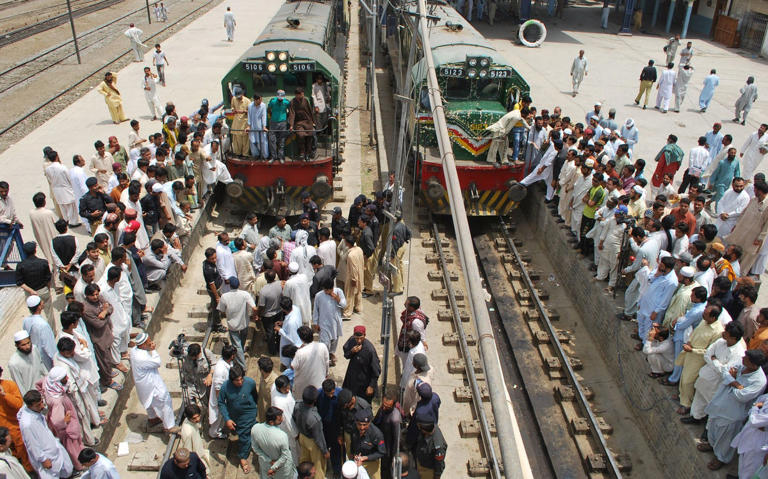EVENTS
At least 17 dead in powerful bomb blast at train station in Pakistan
Published
5 months agoon
By
Ekwutos Blog
At least 17 people have died in a powerful bomb blast at a train station in Quetta, southwestern Pakistan, officials said.
Another 30 were wounded in the explosion that tore through the station in the early hours of Saturday.
“The blast took place inside the railway station when the Peshawar-bound express was about to leave for its destination,” said Muhammad Baloch, the senior superintendent of police operations.
Quetta is the capital of the restive Balochistanprovince, which has seen a growing threat in recent months from local militant groups.
Preliminary visuals of the aftermath of the explosion showed the platform littered with passengers’ luggage.
Mr Baloch said the attack “seems to be a suicide blast” but it was too early to say for sure. Around 100 people were present at the station at the time of the attack, Mr Baloch said, citing footage of the incident.
The death toll is likely to rise as some of the wounded passengers are in critical condition, said Shahid Ring, a government spokesperson.
An investigation has been launched into the incident to ascertain the nature of the blast, he said, according to the daily newspaper Dawn.
The Balochistan Liberation Army, a separatist group that operates in the region, has claimed responsibility for the attack and said a suicide bomber targeted troops present at the railway station. Police officials said they are investigating the claim.
If confirmed, it would be the second deadly attack by BLA militants in a little over a month in Pakistan.
On 7 October, at least two Chinese nationals were killed after BLA militants carried out a bomb attack near the international airport in Karachi. The attack took place just a week before a high-level summit of the Shanghai Cooperation Organisation (SCO), raising security concerns for the meeting of world leaders.
BLA militants have repeatedly targeted security forces and foreigners, especially Chinese nationals who are in Pakistan as part of Beijing’s multibillion-dollar Belt and Road Initiative, which includes the construction of major infrastructure projects in Pakistan.
The militant group sees the presence of foreign workers as a threat to local resources and its grip on the restive southwestern region.
From news to politics, travel to sport, culture to climate – The Independent has a host of free newsletters to suit your interests. To find the stories you want to read, and more, in your inbox, click here.
You may like


Champions League quarter-final: Arsenal thrash Real Madrid as Inter beat Bayern


US tariffs won’t have much effect on Nigeria – FG


Wike hosts suspended Rivers lawmakers in UK


Pascal Dozie, Founder Of Diamond Bank Passes Away At 85


Tuface’s lover Natasha Osawaru replaced as Deputy Leader after shake-up in Edo Assembly


Nigeria seeks to host 2030 Commonwealth Games
EVENTS
President Tinubu: We Will Engender Well-trained, Tech-driven, Modern Police Force
Published
1 day agoon
April 7, 2025By
Ekwutos Blog
STATE HOUSE PRESS RELEASE
President Tinubu: We Will Engender Well-trained, Tech-driven, Modern Police Force
**Outlines decisive measures to improve welfare, working conditions of personnel
*Says FG has institutionalized April 7 as annual National Police Day
President Bola Ahmed Tinubu has restated his administration’s resolve to engender a Nigeria Police Force that is well-trained, well-motivated and well-equipped with modern tools and technology to effectively combat crime in Nigeria.
This, he said, had become necessary ensure to ensure the nation’s security forces are constantly “steps ahead of those who threaten the peace, welfare, and prosperity” of the nation.
Speaking on Monday during the maiden edition of the National Police Day celebrations which climaxed a week-long activities to mark the 2025 Police Week at the Eagle Square in Abuja, the President formally announced the institutionalisation of April 7 every year as National Police Day to honour fallen heroes of the force and also acknowledge the heroics of its personnel.
President Tinubu who was represented by his deputy, Vice President Kashim Shettima, declared: “As President, I reaffirm this administration’s steadfast dedication to the welfare and empowerment of the Nigeria Police Force. A secure Nigeria is vital for our collective prosperity, and this vision begins with ensuring that our police force is well-equipped, well-trained, and well-motivated.
“We are resolute in our commitment to police welfare and comprehensive reform. To that end, let me assure you that the Federal Government of Nigeria will institutionalise 7th April as an annual celebration of National Police Day, cementing its place in our national calendar and demonstrating our enduring appreciation for the Nigeria Police Force.”
The President outlined decisive measures his administration is currently putting in place to immediately engender an effective and formidable police force, including provision of modern tools and technology to enhance the operations of the force, as well as adequate accommodations, accessible healthcare and quality education for families of police personnel.
“In this light, we are taking decisive steps to improve the conditions under which our police officers serve. Adequate housing, accessible healthcare, and quality education for your children are priorities we are committed to fulfilling.
“These promises will begin to materialise immediately. We are also determined to equip you with modern tools and technology to enhance your effectiveness in combating crime. Furthermore, we will ensure that your salaries and benefits reflect the gravity of your responsibilities and the risks you face daily. Anything less would be unacceptable,” he stated.
President Tinubu assured Nigerians that his government “will leave no stone unturned in ensuring effective policing, the safety of lives and property, and the resolution of internal security challenges such as banditry, insurgency, and kidnapping,” maintaining that the administration remains resolute in its mission to restore peace and security across all regions of the country.
Emphasizing the role of the Nigeria Police Force, he described the force as a cornerstone of the nation’s security, the first line of defence against crime, even as he maintained that the police are protectors of the nation’s democracy and the custodians of citizens’ safety.
“Your role is indispensable, and your contributions are immeasurable. Why have we established National Police Day? The answer is straightforward. This day serves to highlight your invaluable service and to honour the officers who have made the ultimate sacrifice in the line of duty.
“To their families, we extend our deepest condolences and our unwavering commitment to preserving their legacy. Let it be clear: 7th April is not merely a date on the calendar. It is a symbol of our enduring partnership and respect for the Nigeria Police Force—a day firmly entrenched in our national consciousness,” President Tinubu added.
He commended the Inspector-General of Police (IGP) Kayode Egbetokun, and his team for what he described as “their remarkable work in advancing reforms aligned with” his administration’s goals, noting that the dedication and commitment of the leadership of the force “are paving the way for a police force that all Nigerians can take pride in.”
Earlier, IGP Kayode Egbetokun, said beyond commemoration of the day of the establishment of the Nigeria Police Force, the National Police Day offers opportunity to remember fallen heroes and also acknowledge the heroics of men and women of the Police in theatres of operation across the country and beyond.
The IGP said the day also provides a platform to emphasize the renewed call for excellence, professionalism, and respect for human rights, among other virtues that the new police force embodies.
He highlighted the reform agenda of the police force under his leadership, noting that the reforms are hinged on building a force that commands trust and professionalism, enforces justice and promotes national development through enhanced security and policing of the country.
The highpoints of the event were the inspection of the guard by the Vice President, procession by tactical units and other security organisations, and the silent drill display by officers of the Nigeria Police Force.
Also present at the event were the Governor of Kwara State, Alhaji AbdulRazaq Abdulrahman; Secretary to the Government of the Federation, Sen. George Akume; National Security Adviser, Mallam Nuhu Ribadu; Chairman, House Committee on Police Affairs, Hon Makki Yallemen and other members of thw National Assembly; Chief of Defence Staff, Gen. Christopher Musa and other Service Chiefs.



Others include Deputy Governors of Delta, Ondo and Enugu States; heads of security and paramilitary organisations; representatives of the Minister of Police Affairs, the Police Service Commission, former Inspectors General of Police and retired senior police officers, among others.
Stanley Nkwocha
Senior Special Assistant to The President on Media & Communications
(Office of The Vice President)
7th April, 2025
EVENTS
Eke Hit Tells Court: “I’m a Content Creator, Not a Traditional Healer”
Published
2 days agoon
April 7, 2025By
Ekwutos Blog
Eke Hit, a popular content creator, recently appeared in court and stated that his online posts are merely comedic skits intended for entertainment purposes.
He clarified that his content does not involve actual shrines or sacrifices, but rather is created to garner views and likes.
Eke content creator emphasized that his online presence is for entertainment purposes only.
Eke Hit’s court appearance has garnered significant attention, with many awaiting the outcome of the case.

By highlighting the comedic nature of their content, Eke Hit and other creators aim to distinguish their work from any potentially misleading or harmful activities.
EVENTS
Tinubu, Obasanjo, Makinde mourn as ex-Oyo gov Olunloyo dies at 89
Published
2 days agoon
April 7, 2025By
Ekwutos Blog
The death of the former Governor of Oyo State, Dr Victor Omololu Olunloyo, has sparked an outpouring of grief from eminent Nigerians, including President Bola Tinubu, former President Olusegun Obasanjo, Oyo State Governor, Seyi Makinde, and many others.
Olunloyo, a renowned mathematician and technocrat, passed away on Sunday at the age of 89, just days before his 90th birthday on April 14, 2025.
He passed on around 1.40 am on Sunday, with his remains deposited at a private mortuary in Ibadan.
The deceased became a commissioner in the old Western Region at age 27, before he served as the Governor of Oyo State from October 1, 1983, to December 31, 1983, before the military regime of Gen Muhammadu Buhari seized power and truncated the democracy of the Second Republic.
His legacy as a brilliant scholar and dedicated public servant left an indelible mark on the educational and political landscape of Nigeria.
In his tribute, Tinubu extended condolences, praising Olunloyo for his pioneering work in mathematics and education, as well as his commitment to national development.
The President’s condolence message was contained in a statement by his spokesman, Mr Bayo Onanuga.
“Olunloyo, renowned for his mathematical prowess, obtained a PhD in Applied Mathematics and Number Theory from St. Andrews University in Scotland at 25 years.
“In 1962, at just 27, he became a commissioner in the old Western Region. He served multiple times as commissioner in the Western State, which succeeded the Western Region.
“Dr Olunloyo will be celebrated in academic circles for his brilliance and foundational contributions to applied mathematics and number theory.
“As an educator, he profoundly influenced future leaders and fortified educational institutions,” Tinubu said.
Reflecting on Olunloyo’s tenure as governor of the old Oyo State, Tinubu remarked: “Although his time in office was brief, his tenure was marked by exceptional vision and leadership.
“The abrupt end to his administration due to military intervention did not deter him from continuing to serve the nation.”
Obasanjo described Olunloyo as a patriotic Nigerian who stood for justice, peace and progress of the country till his last days on earth.
He said Olunloyo remained one of the notable Nigerians with deep blood of patriotism running in their veins.
In a statement by this Special Assistant on Media, Kehinde Akinyemi, on Sunday, the former President said “It was shocking and worrisome because we had lost Chief Ayo Adebanjo, Chief Edwin Clark, and now Dr Olunloyo just in weeks.
“Indeed, the ranks of the nation’s leadership are fast depleting by the loss of our dedicated and resourceful patriots who served the nation in various capacities, particularly at this crucial state in our nation’s history when their wise counsel and rich experience are greatly needed.”
Obasanjo commiserated with Makinde, the government and the good people of Oyo State and consoled them with the facts that Dr Olunloyo lived a life worthy of communal emulation, touched the soul of his community and mourned by all.
Makinde, in his tribute, expressed pride in having honoured Olunloyo during his lifetime, by naming significant landmarks after him.
He described Olunloyo as one of the state’s most cerebral leaders, whose contributions to education and governance would continue to inspire future generations.
Makinde, in a statement by his Chief Press Secretary, Sulaimon Olanrewaju, described Olunloyo’s death as the exit of one of Oyo State’s and Nigeria’s most cerebral former administrators.
“My joy is that our government immortalised and honoured Pa Olunloyo in his lifetime and he was present to witness it, as we named the Ibadan Airport Road and the Leisure Park on the axis after him, in recognition of his service to the state,” the governor stated.
“In Olunloyo, we have lost another icon. This time, we lost a highly cerebral and patriotic leader, who served our great state at its early stages.
“This death hits differently because I was looking forward to Baba’s 90th birthday, which would have come up on April 14, 2025,” he added.
The Southern Governors Forum described Olunloyo’s death, a few days before his 90th birthday, as a great loss to Nigeria and intellectuals around the world.
The chairman of the forum and Ogun State Governor, Dapo Abiodun, in a statement on Sunday, expressed the forum’s condolences to Makinde, and the government and people of Oyo State.
The forum described Olunloyo as a titan who left legacies that every Nigerian should be proud of, adding that he was a highly accomplished scholar and a genius even among geniuses.
The governor added that Olunloyo’s achievements as a prodigious scholar with reputable papers, and as an octogenarian with a sharp memory and wit, not to mention a lifelong dedication to books and the quest for knowledge in various fields, were well known.
He said: “Alas, like many giants before him, Dr Omololu Olunloyo has gone to rest.
“Although a scientist, Baba loved reciting poetry, particularly those by William Shakespeare, and, remarkably, did not read with glasses even in his old age.”
The former governor of Oyo State and the Otun Olubadan of Ibadanland, Oba Rashidi Ladoja, described the passing of a renowned mathematician, engineer and technocrat as the exit of a titan.
The senator representing Oyo South Senatorial District, Sharafadeen Alli, expressed sorrow over the passing of Olunloyo.
A statement by his Special Adviser on Media, Akeem Abas, in Ibadan, described Olunloyo’s death as the end of a golden era of wisdom, scholarship, and statesmanship in Nigeria.
He described Olunloyo as a towering intellectual and one of the brightest minds to ever serve in public office in Nigeria.
“The death of Olunloyo is a monumental loss to the state and Nigeria at large. He was a symbol of brilliance, simplicity, and unwavering commitment to public service.
“His contributions to governance, academia, and the development of our dear state remain unmatched,” he said.
The Speaker of the Oyo State House of Assembly, Mr Adebo Ogundoyin, described the late Olunloyo as a man of extraordinary intellect and dedication.
The speaker, expressing deep sorrow in a statement on Sunday, said Olunloyo’s contributions to the development of Oyo State and Nigeria remained unparalleled.
Ogundoyin said it was unfortunate that the state had lost a walking encyclopaedia and a pillar of wisdom in Nigerian politics.
“
Olunloyo was not just a leader; he was a beacon of knowledge and a source of inspiration to many. I read a lot about Olunloyo and marvelled at his level of knowledge.
“His legacy as a mathematician, engineer, and technocrat will forever be etched in the annals of history,” the speaker remarked.
Ladoja, in a statement by his media aide, Adeola Oloko, in Ibadan, said the late Olunloyo was a man of many parts who left his footprints on the sands of time.
“
Olunloyo shone and sparkled like a star right from his Government College, Ibadan days all through his university days in Scotland, which culminated in his becoming one of the youngest PhD holders in his days.
“He gave a good account of himself as one of the most officed persons with a long public service record in Nigeria,” Ladoja said.
The former governor said the greatest legacy of Olunloyo’s long service record was his incorruptibility.
Ladoja recalled that Olunloyo visited him in his Bodija, Ibadan residence only two weeks ago, adding that “He was in the wheelchair. I was surprised to see him.
“We discussed for an hour before he left. Whenever my elder brother came around, you can be sure there would be no dull moment. But then, I did not have a premonition that his visit was his way of bidding us farewell.”
The Executive Chairman of the Federal Inland Revenue Service, Zacch Adedeji, described the death of Olunloyo as the dropping of one the finest stars from Nigeria’s sky.
Adedeji, in a statement by his Special Adviser (Media), Dare Adekanmbi, in Ibadan, said the deceased was a genius of a rare breed, adding that he marvelled at Olunloyo’s intellectual depth and native intelligence.
“Papa Olunloyo could rightly be described as Nigeria’s Albert Einstein. He graduated with first-class honours and proceeded to bag a PhD in Applied Mathematics at the age of 26 at the University of St Andrews, Scotland.
“Every moment I shared with Papa while he was with us was an opportunity to pick lifelong lessons. He was very deep and his intellect was not just in Mathematics, but also in Classical Music with a bias for W.A Mozart’s works as well as in Literature.
“He would recite paragraphs and even lengthier dialogues from Shakespeare’s works and show how the lessons therein can be applied to life and living,” he said.
Adedeji lamented that a library of encyclopaedic collections had been set ablaze with the departure of Olunloyo.
The pan-Yoruba socio-political organisation, Afenifere, commiserated with the people and governor of Oyo State over the death of Olunloyo.
In a statement by the National Leader of Afenifere, Pa Reuben Fasoranti, on Sunday, the group said the late Olunloyo left an indelible mark on Oyo State’s history through his tireless contributions to education, governance, and public service.
The statement read, “Afenifere is deeply saddened to hear of the passing of Dr Victor Omololu Olunloyo, the former governor of old Oyo State.
“As a brilliant scholar, mathematician, and engineer, Dr Olunloyo left an indelible mark on Oyo State’s history through his tireless contributions to education, governance, and public service.
“His vision for a better future, leadership, and commitment to the people of Oyo State will forever be remembered. We extend our heartfelt condolences to you, the people of Oyo State, and all who knew him.”
A
former Postmaster General of the Federation, Ismail Adewusi, on Sunday, described Olunloyo as a rare gift that Nigeria never appreciated.
In a statement in Ibadan, Adewusi described Olunloyo as an abundant gift to humanity, whose full opportunities Nigerians never tapped.
He said Olunloyo was a genius who, in other climes, could have been allowed a massive space to bring to bear on the country his rare mental capacity.
“The late Olunloyo was a global phenomenon in Applied Mathematics and Number Theory. At a time when such areas of studies remained in the realm of esoteric academic pursuits, Olunloyo had emerged as a master of the Numbers.
“But his depth of knowledge transcended the numbers game. He was deeply knowledgeable in history, literature, and to a very appreciable reach, law, and philosophy,” he said.
Speaking of Olunloyo’s aversion to mediocrity, Adewusi recalled that he was a man who championed the course of merit in all spheres of life.
Expressing sympathy with the immediate Olunloyo family, Adewusi also commiserated with the entire people of Ibadan and the state in general, noting that Olunloyo’s place in history was assured.
He urged the government to look for a more befitting way to immortalise the late academic and political icon.

Champions League quarter-final: Arsenal thrash Real Madrid as Inter beat Bayern

US tariffs won’t have much effect on Nigeria – FG

Wike hosts suspended Rivers lawmakers in UK
Trending

 Trending6 months ago
Trending6 months agoNYA demands release of ‘abducted’ Imo chairman, preaches good governance
- Business6 months ago
US court acquits Air Peace boss, slams Mayfield $4000 fine

 Politics6 months ago
Politics6 months agoMexico’s new president causes concern just weeks before the US elections
- Entertainment6 months ago
Bobrisky transferred from Immigration to FCID, spends night behind bars
- Entertainment6 months ago
Bobrisky falls ill in police custody, rushed to hospital

 Politics6 months ago
Politics6 months agoRussia bans imports of agro-products from Kazakhstan after refusal to join BRICS

 Politics6 months ago
Politics6 months agoPutin invites 20 world leaders
- Politics1 year ago
Nigerian Senate passes Bill seeking the establishment of the South East Development Commission.

